There are few foods as demonized and confusing as bread. Especially when it comes to kidney health. White or wheat? Is whole grain better? Read on to get the truth about the best bread for kidney disease.
*Please note that this post contains clearly identified affiliate links. As an Amazon affiliate, I may earn a small commission on qualifying purchases (at no extra cost to you).
Table of Contents
Is Bread Good For Kidney Disease?
In short, yes! Bread and other healthy carbohydrates are an important part of a healthy diet for kidney disease.
You may be thinking “But doesn’t bread have carbs?”. Answer: yes! Bread is a wonderful source of carbohydrate, and this is a GOOD thing!
Carbs have been demonized, perhaps partially due to the “keto” diet craze. But carbohydrates are actually a critical part of a healthy diet for kidney disease.
Bottom line: Bread is good for kidney disease! But, you want to make sure you choose mostly healthy, fiber-rich bread (more below!). And, that you eat bread and other carbohydrates as part of a balanced diet.
A Quick Nutrition 101 Lesson
To understand why bread and carbohydrates are an important part of a kidney friendly diet, we need to go back to Nutrition 101.
We get calories from 3 main sources: carbohydrate, fat and protein. Alcohol also contributes calories, but that doesn’t usually contribute a significant amount!
In general, diets that are lower in protein are easier on kidneys. (1) If we reduce the calories from one of these 3 groups, the proportion of calories must increase from another. Our bodies need calories to function!
For kidney health, it is usually best to reduce calories from protein, increase calories from carbohydrate and continue to eat a moderate amount of calories from fat. Very high fat diets can contribute to heart disease, which is a big concern for people with kidney disease.
If you are a numbers person, this is how this all breaks down. Here is an example for someone who weighs 175 pounds (79.5 kilograms) and needs about 2,000 calories. If this person had stage 3 Chronic Kidney Disease, they might need:
- 50 grams of protein (10% of calories)
- 300 grams of carbohydrate (60% of calories) – this is about 20 slices of bread!
- 67 grams of fat (30% of calories)
Please check with your dietitian to know exactly how much protein, carbohydrate and fat is right for you! A kidney friendly diet is different for everyone.
Bread for People with Kidney Disease & Diabetes
I know what many of you are thinking. What if I have both diabetes AND kidney disease? Then surely I should stay away from bread?
Nope! Bread is absolutely okay for people with diabetes too! Again, the key is portion size, choosing bread with plenty of fiber, and what you eat with it.
Of note, a very low protein diet may not be the best choice for people with both kidney disease and diabetes. Ask your dietitian what is best for you.
Learn more about a diabetic renal diet!
The Whole Grain Bread Dilemma
A Google search (or, an outdated handout at your doctor’s office), may lead you to believe that white bread is the best bread for kidney disease. This can be really frustrating and confusing, since whole grain bread is usually a healthier option.
Traditionally, white bread was recommended for people with kidney disease because it has less potassium and phosphorus. But, this recommendation was a little narrow minded and we know much more now!
There has been a big change in in the recommendations for people with kidney disease. In 2020, the National Kidney Foundation and The Academy of Nutrition & Dietetics released updated nutrition guidelines for people with Chronic Kidney Disease. These guidelines recommend taking the absorption of phosphorus from different food sources into consideration.
Only about 30% of the phosphorus in plant foods, like whole grains, beans, nuts, seeds and lentils, is absorbed. Compare this to phosphorus in meat and dairy, whereabout 80-90% of phosphorus is absorbed. Even worse, phosphorus from food additives is nearly 100% absorbed. (2) (3)
On the potassium front, not everyone with kidney disease needs to limit potassium.
So, gone are the days of recommending white bread for kidney disease. Whole grain IS the best bread for kidney disease! It may be slightly higher in phosphorus, but most of it isn’t absorbed anyway!
Tips for Finding the Best Bread for Kidney Disease
As always, the key to finding kidney friendly foods is to look at the nutrition label. Here are my keys to finding the best bread for kidney disease!
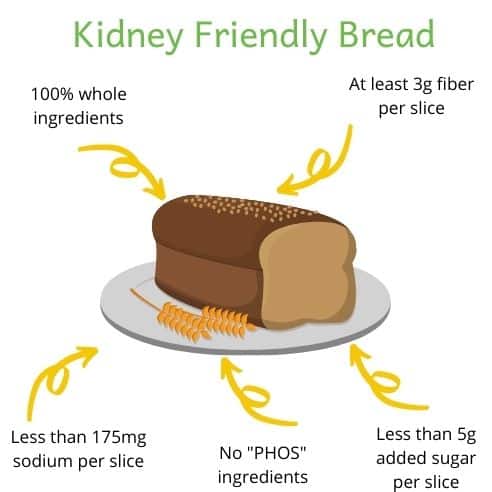
Whole Grain Ingredients
The marketing industry is really good at making bread look like it is good for you, when that may not be the case.
Look for ingredients that are “100% whole grain…”. Examples are:
- 100% whole grain wheat
- 100% whole grain rye
- 100% brown rice
Fiber
One of the biggest benefits of bread for kidney disease is fiber! Fiber can help control blood sugar, which in turn helps protect your kidneys. Fiber is also good for gut health. We are learning more and more about how the gut and kidneys are connected. (4)
I recommend looking for bread with at least 3 grams of fiber per slice.
Sodium
A low sodium diet is key to nearly any kidney-friendly diet. Most people should limit sodium to 2,300mg per day. (5)
Bread is a surprising source of sodium in the American diet. Up to 10% of the sodium we eat in the United States comes from bread. (6)
Look for bread with no more than around 175mg sodium per slice.
Phosphorus
Again, phosphorus that occurs naturally in whole grain bread is not a concern. However, some breads have phosphorus food additives in them. We DO care about this added phosphorus.
Avoid bread that has any “PHOS” ingredients in it.
Sugar
Some bread has a surprising amount of added sugar.
Watch out for sugar ingredients in bread. Remember, sugar is sugar. Here are some ingredients that are masquerading as sugar:
- Granulated sugar
- Cane sugar
- Brown sugar
- Molasses
- Honey
- High fructose corn syrup
- Beet sugar
- Syrups (like barley malt syrup or rice syrup)
- Agave
- Sucrose
- Maltose
- Dextrose
- Galactose
Aim for bread with no more than 5 grams of added sugar.
Top 3 Best Breads for Kidney Disease
Ezekiel Sprouted Whole Grain Bread*
This bread has 3 grams of fiber per slice and only 75mg of sodium. No phosphorus additives here!
Brownberry Whole Grain Health Nut Bread*
This brand is commonly available in grocery stores across the United States. Brownberry bread tends to be phosphate additive free and a good whole grain option.
Dave’s Killer Whole Grains & Seeds Bread*
If you love seeds and visible whole grains in your bread, this bread is for you! All of these nuts and seeds give this bread a whopping 5 grams of fiber per slice.
Is Sourdough Bread Good for Kidney Disease?
I get this question a lot. Sourdough bread is quite tasty, but isn’t necessarily good for kidney disease.
“Sourdough” refers to the process of making the bread, not the nutritional value. Rather than yeast, sourdough bread gets it’s rise from fermentation. This fermentation gives sourdough bread that slightly funky, sour flavor.
Typically, sourdough bread is made from white flour. It isn’t better for you than plain old white bread. As always, check the nutrition facts label to look for bread with plenty of fiber!
Is Rye Bread Good For Kidney Disease?
Another common question. Don’t be fooled by it’s dark color. Similar to sourdough, rye bread is not necessarily made with whole grain flour.
Most rye bread is made from rye flour that has had the fiber-containing parts of the kernel removed. This is the same process wheat goes through to make white flour.
However, you can find whole grain rye bread! Look for “whole grain rye flour” in the ingredients.
Other Healthy Carbohydrates for Kidney Disease
Remember, bread isn’t the only healthy carbohydrate for kidney disease! There are plenty of tasty options!
- Whole Grain Pasta
- Brown or Wild Rice
- Quinoa
- Farro
- Kamut
- Barley
- Wheat Berries
- Popcorn
- Oatmeal
- Fresh or frozen fruit
Happy Eating!
Melanie

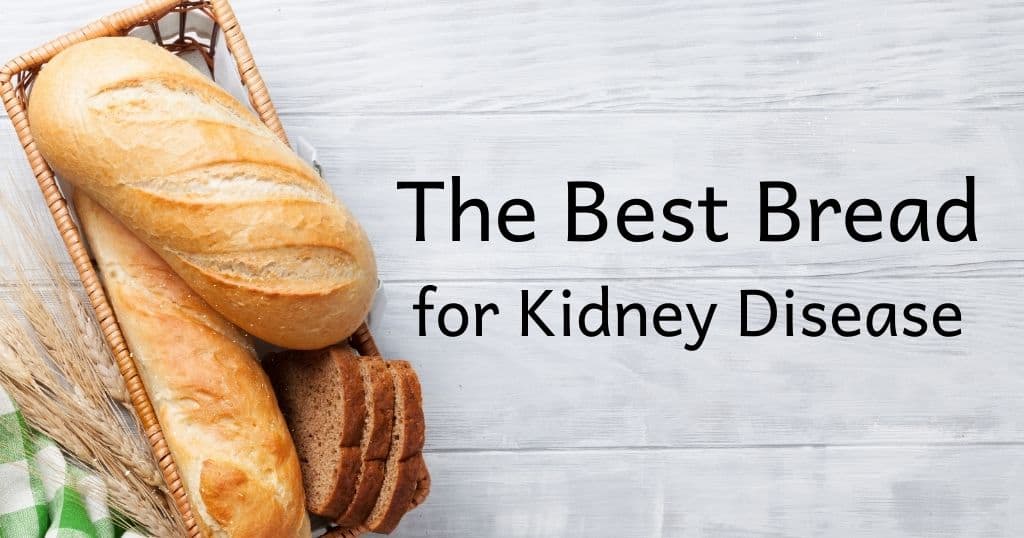
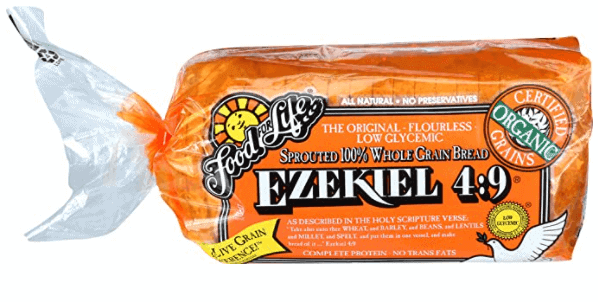
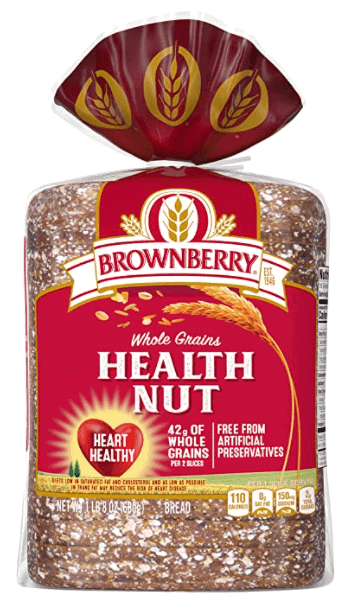
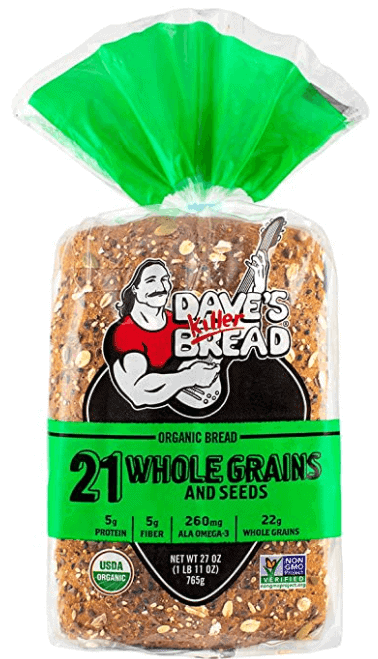
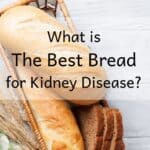
I get confused now i sm diabetic w/ high creatinine also w/ arthritis what i am going to eat now pls help i’ m starving
The nutrition for each of these conditions is actually VERY similar. I can’t make recommendations for what YOU should eat without a more complete review of your labs and medical history. I’d recommend working with a dietitian. I have a list of dietitians who help people with kidney disease here.
I also, have Type 3 CKD and also, Arthritis which they are trying to decide if it Osteo or Rhuemotoid. The first doctor I went to wouldn’t give me medicine for Arthritis because of Kidneys.
I am now trying another Dr. for Arthritis. I also, go to a Nephrologist for the Kidneys.
I just want to get on a healthy path so Kidneys don’t get worse.,therefore I found you.
Thank You for good information as I have a lot to learn. I don’t know much about kilograms, mcg, gr., etc. !
Hi! Bloodwork results caused my PC to refer me to a nephrologist, but I can’t get in for 6 months. In the meantime, I would like to do whatever I can to mitigate damage. A stumbling block is that I was just diagnosed with redundant colon, and the diet for that seems to be at odds with the kidney diet. I know you cannot speak to individual issues, but do you have a “start here” post or article that can guide me on some safe steps to take before seeing the nephrologist? many thanks!
Hello! This post about what a renal diet is is the perfect place to start! I also have a list of dietitians who do with with people who have kidney disease that I recommend!
My dilemma is I have low kidney function and diverticulitis. So I’m not suppose to have the wheat, seeds and nuts because of my colon. Phosphate, phosphorus, sodium, potassium, creatinine, or purine.
I don’t know a lot of what to eat or not to eat, but especially on breads.
Any suggestions?
Hi Shelia! I can’t say what is best for you specifically without reviewing your medical history, current eating habits and labs. I have a list of dietitians who would love to help on my resources page!
Is there an online sight, or accessable list I can get that which widely covers the percentage of phosphorus that gets into the body in most of the foods we eat (especially those that are not meat and/or dairy)???
I cover this topic in this article. I would never recommend getting so granular as each specific food – this type of list would be unnecessary and doesn’t exist. BUT, thinking about the big picture and how much phos generally is absorbed from each different food group certainly DOES make sense!
I make my own white bread without adding salt and using less sugar is that okay or should I be using whole wheat flour or buying whole wheat bread.
Kidney nutrition is different for everyone, so I can’t safely say what is best for you. However, I do recommend whole grains for most people with kidney problems. Learn more here!
Is here a reason why you did NOT recommend the “Ezekiel Low Sodium” from Food for Life?
Nope! That would be a good option as well!
I disagree because Brownberry Health Nut Bread has Nuts and Nuts are loaded with phosphorus. And unless you’ve had the pleasure of a CONSTANT, UNRELENTING itch all over your body then you would not understand that this bread is NOT a good choice for kidney patients on dialysis.
Plant based sources of phosphorus are not well absorbed – so actually can be a good choice for people with high phosphorus concerns. Here is a link to an article about updated recommendations about phosphorus!
what is the verdict here?
I have not found hot dog buns or hamburger buns that are low or no sodium. Have you?
Leonard Ginsburg
[email protected]
It can be hard! You can always compare the brands available at your grocery store and find the brand that is the lowEST in sodium.
“Hawaiian” rolls or buns are generally much lower in sodium.
Yum! They also tend to be higher in sugar as well.
Thankyou for this! I’m a diabetic
vegan with kidney issues! this article has let me decipher fact from fiction as well as pointed out more updated guidelines! I’m always searching for recipes that are diabetic and kidney friendly which can be challenging, especially when vegan😊
Vickie, I was just diagnosed with high blood pressure and am on medication that wants me to limit my potassium and salt. I’m having a hard time finding things to eat and would love some help if you have the time.
Walmart Carrie’s a brioche bun that is 200mg sodium. That is the best I can find.
Thank you, thank you, thank you for clarifying the bread dilemma. I was really getting stressed out. I make my own bread and my sourdough starter is made from only 10% white flour and the rest from whole grain wheat and rye flour. I finally feel more at ease about this topic.
I’m so glad I could help!
Thanks for your recent bread article. I have celiac disease and 3a CKD. Also intolerant of Xanthum gum and all the other food gums and stabilizers out there. Rice based GF breads are pasty. But have you seen my go-to bread now? SimpleKneads.com. Very wirth your while to check out. Thanks for all your great info.
Thanks for sharing the recommendation!
Hi Diana
Can you give me the receipe of the bread please with sourdough starter
Thanks
Elsabe
e-mail
[email protected]
Hello Melanie – very thankful for your article. Would like your thoughts on Angelic Bakehouse – 7 Sprouted No Salt Added Whole Grain Bread.
Breakdown is this, 25 mg sodium, 3 grams fiber, 2 grams sugar, 5 grams protein, and no potassium. I don’t see any phosphate listed….
Any feedback is super appreciated!!
This looks like a generally good choice! Reasonable sodium and no phosphate additives!
Hi Melanie,
I just started my research as I have recently found that I am in stage 3a of CKD. I have been enjoying spelt as my bread for about a year now. Is this a good choice? And I’ve always used brown rice but I found it on an “avoid” list. Can you comment on this? And…I eat a green salad with feta, kidney beans, black olives (I know I must give these up) blueberries and whatever other berry is on sale, olive oil and lemon at least once a day. Will rinsing the kidney beans (canned) remove enough salt? My sodium level in not high on my testing and I have never successfully cooked a bean. 90% of what I eat are whole foods. And how much protein is acceptable? The majority of mine is plant based currently but I do like to add ground turkey to cabbage. I’m still in shock to hear this diagnosis. Would appreciate your input. Thanks
Hi Deb! I really can’t say what is best for YOU as a renal diet is different for everyone. Brown rice is unfortunately often on “bad” lists for CKD because of it’s phosphorus content, but we no longer recommend restricting whole grains for CKD (learn more why here). Rinsing canned veggies will remove about 1/2 the sodium. Know that a blood test for sodium actually tells us nothing about how much sodium you are eating, so just because you had a normal result, unfortunately doesn’t tell us you aren’t eating too much sodium. Protein needs are different for everyone. I’d highly recommend meeting with a dietitian to help you put all of this together, there are just too many moving pieces for anyone to figure out on their own! I have a list of dietitians I recommend on my resources page if your nephrologist doesn’t have a renal dietitian to refer you to. Don’t worry, you’ve got this!
You can stir-fry the green beans. I use a garlic/ginger cooking oil or you can use olive oil, also add more garlic (if you prefer) you can add water to the beans in the frying pan, in my case, I use Swanson’s Unsalted Chicken Stock about half cup. Put a lid on the frying pan and shake the pan back and forth periodically as you’re cooking the string beans. Cook until the green beans becomes a very pretty dark green. Taste test it and if you want it softer, cook longer until you find the consistency you want. Hope this helps…….Bon Apetit
Is there a link to the updated guidelines? It’s mentioned in the article but there’s no link. I tried searching online but could not find a webpage from the aforementioned organizations.
Absolutely! Here are the official guidelines.
Hi Melanie,
I’m a CKD patient. Is eating oats, beans, lentils ok as these contain phosphorus.?
Hi Joanne! Phosphorus that occurs naturally in these foods isn’t nearly as absorbable as artificial phosphorus. Foods that are “okay” to eat are different for everyone, but this article about phosphorus should help!
Melanie, thanks so much for this information. In December 2020, I found out I was in kidney failure. I also had a case of iritis. Long story short, in a few months, after 5 doctors, tons of bloodwork, and bone marrow and kidney biopsies, I found out I have a rare autoimmune condition, TINU syndrome, which affects eyes and kidneys. I’m now stage 3B CKD without having to do dialysis, all managed with meds and diet, and it’s been hard because I’m not a typical CKD patient. I’ve been struggling a bit with the phosphate additives (trying to avoid), but this post helps a lot. Thank you!!!
I’m so glad, Martha! Thank you so much for sharing.
Feeling overwhelmed afraid to eat or drink wrong things and at stage 3b . Few years ago had small bowel blockage and surgery ended up weighing 95 pounds 4 yrs later 106
Now nauseated and scared. I have always had low potassium and low sugar and stent in LAD in heart advice on diet trying to see if I need a nutritionist dietitian? I have so so many health problems this just knocked me over bad:( thanks
Hi Teresa! I’m so sorry to hear you are feeling overwhelmed – I know you aren’t alone in that feeling. Trying to sort out all of this is overwhelming for anyone! I would 100% recommend you work with a dietitian – they can really help you sort all of this out and understand what is best to eat for YOU! Ask your doctor for a referral right away! I also have a list of dietitians I recommend that work with patients on my site.
Can you please send me some info about foods that are good for my CKD stage 3
Hi Shirley! A healthy diet for CKD stage 3 is different for everyone. This post dives into how a renal diet is different. The best way to understand what is best for you is to meet with a dietitian.
Hi. Thanks for the updated info on phosphorous. Can you please shed a bit more light on potassium rich foods? As CKD patient, this is a big worry, as I prefer whole grain foods. I have eliminated beans and legumes almost completely because of high potassim and phosphorous. Being vegitarian, this really sucks. It’s almost impossible to only eat aboit 5- 10 beans in a dish.
Also i would strongly recommend all people who have commented on your post, to also go to a Naturopat for advice on what is the best food to eat for kidney patients. Going vegitarian or even beyyer vegan will Really Really improve kidney function.
You are so welcome! Here is my post about potassium – many people with kidney disease are unnecessarily limiting potassium!
Which brand of white bread can I eat on a Renal diet? I was at stage 3 but now I’m at stage 4. Plus another question, how many days a week does it take for a creatinine to be lowered down? It’s at 3.46 2 days ago.
Hello! I actually recommend whole wheat bread for most people with CKD due to the lower bioavailability of phosphorus and higher fiber content. Creatinine naturally fluctuates a bit every single day. As a general rule over time, the goal is to stop creatinine from getting any higher – not necessarily for it to go down. Although patients do report seeing creatinine go down after following a healthy kidney diet, there isn’t research to show that diet can actually improve kidney function, but there is a lot to show that it can help stop kidney disease from getting worse!
I am stage 5 & live in the UK please what bread can I buy to eat here. It seems the comments are always in the USA what about other countries we have CKD?
Hi Pamela! As I live in the US, I’m not familiar with common products in other countries. Hopefully this post gives you some guidelines to help you find a kidney friendly bread at your local store – not to high in sodium or added sugar, plenty of fiber, and no phosphorus additives!
I know it’s not as convenient but there are recipes (Google it) to make Ezekiel flourless bread at home . I haven’t tried it yet but am going to as the Food for Life Ezekiel is a little dry, maybe because it has to be frozen in the store since it has no preservatives.
I have stage 3 kidney disease and want to no if I can eat pumpernickel bread?
Absolutely! Everything can fit into a diet for CKD. Nutrition is different for every single person. Learn more here!
Thanks you so much for your up to date information!! This lifestyle is new to me and you are helping considerably!!
You are so welcome! I’m glad you found it helpful!
Sorry am only having issues concerning to much protein which is my kidney are licking protein can I eat bread and what else can I add to it
Hi Michael – a kidney friendly diet is different for everyone, so it is impossible for me to say what is best for you. You can learn more here!
I have stage 3 kidney disease and have had a oxalate kidney stone removed. I’m thinking of becoming a vegan. My dilemma is that foods (nuts, beans whole grains etc.) which are good for kidneys are bad for kidney stones. I’ve heard that buckwheat and macadamias nuts are OK. Any advise, thanks
Hi Bob! A vegan or vegetarian diet is very doable for kidney stones – it even has many stone protective aspects – and obviously is very beneficial for CKD. I think the key is assessing if/how much you need that oxalate restriction and working with someone to help you balance all aspects of your health. Many people with calcium oxalate stones don’t need to limit oxalate. Having this information makes the whole process much easier and clear! There are actually more similarities than differences for healthy eating for calcium oxalate stones and CKD! If you’d like my help with this process, this is exactly the purpose of Kidney Stone Nutrition School. This walks you through each aspect of nutrition for kidney stone eating and helps you determine if this will help you or not! I hope this helps!
There’s also some good information about PLADO (plant dominant low protein) but it isn’t a substitute for working with a renal dietician or nephrologist. It does a good job though of providing guidelines that are a good talking point for your visit with your renal professionals. It was a good education for me so that I could discuss food and recommended tests to see if I am following a diet that is helping my kidneys.
I love this Emma!
I like popcorn. But who wants to eat it without butter and salt. Yuck!
Popcorn is my favorite snack! I had some last night, in fact! I love to make it on the stove with canola oil and just a pinch o salt. It really is delicious, I promise!
I love popcorn, it’s one of my favorite snacks I pop it on the stove with a pinch of salt or sugar. My second favorite snack is strawberries.
Yum! Love it!
I’m in stage 3 CKD and am terribly stressed every day by the conflicting limits of different foods and “good” or “bad” for you information that is supposedly correct. For every informative article (as well as diet info. from my Nephrologist…), I can find a differing opinion saying DO NOT eat that, when I was told DO eat those certain foods! WHERE is the final, absolute correct foods listing? I bought sweet potatoes because they were listed as GOOD for CKD…next article or listing I saw, they were listed on the “AVOID” list and NOT on the “ENJOY” list, which was one suggested foods list comparison I thought was well-defined and very simple to understand. My next appointment is with a Therapist to try to make my mind accept my situation…???
Hi Char! I know it can be SO utterly confusing and frustrating trying to figure out what is “best” to eat for CKD. There is SO much conflicting information out there. I think part of the reason there is so much conflicting info is that there is NO one single “kidney diet” – healthy eating for your kidneys really needs to be individualized to your lab values and past medical history.I would HIHGLY recommend working with a dietitian individually to help you understand what is best for YOU! I have some dietitians who work with clients on my resources page. Because you have stage 3 CKD, I’d also highly recommend checking out Jen Hernandez’s online program-Plant Powered Kidneys. She helps you understand how to interpret your own labs and tailor your diet to them. I hope that helps!
I am stage 3A only because I have one kidney due to cancer from the other my nefrologist tells me that my kidneys in good shape only have some scarring. She recommends eating normally with a good balanced diet because my kidney is not what she considers damaged there’s damaged other than the scarring. Yeah scaring. Can you tell me am I able to eat without you’re clients are already without having to worry about everything everybody else is worrying about and just watch my amounts I’m already very aware of phosphorus potassium sodium and protein I eat very little as I don’t really care to eat but I am a bread eater and everyone has told me to eat white bread everyone and now I read your comments and you’re saying no Can you please give
Is clear understanding about the bread and the bread and do I really need to be as strict as others are with damage kidneys? Is long if you lost it’s hard
I like tapioca pudding it’s the only real dessert I like is that bad for me since I’m not as restricted as others? I really want to be able to eat that.
Thank you for your time period
Luana
Hi Luana! I cannot provide personalized nutrition information, as the answers to your questions are different based on your labs, other medical history and current eating patterns. I’d highly recommend asking for a dietitian referral to get good answers to all of these questions, and learn what else you can do to help protect your remaining kidney!
I am in stage 5 kidney disease & do not want dialysis. I am doing “Stoping Kidney Disease” diet by Lee Hull. My lab #’s have greatly improved. Check out the food guide even if you don’t want to read the whole scientific premise of the diet. Mr Hull is a ckd patient himself. 👍
I have the EXACT same issue with the Avoid/Enjoy lists for people with kidney stones. I’m to increase water, avoid sodium, limit sugar, limit protein, and avoid oxalates or choose low oxalate foods—hard to hit all those goals. Worst part is to read same foods on different lists are good vs bad depending who created it.
This is the issue with just handing people a list of foods that are “good” and “bad” and sending them on their way! Kidney stone nutrition is ALL about how to build healthy meal patterns, NOT about completely avoiding endless lists of foods. On that oxalate front, I find that low oxalate diets are handed out like candy, without a proper investigation into if oxalate is even the cause of the kidney stones (it is NOT the cause of all stones, even all calcium oxalate stones!). I help people put all of this together, and (perhaps most importantly!) help them understand which dietary changes would actually prevent kidney stones for THEM, in Kidney Stone Nutrition School!
Im right there with you. ??????
Hi Melanie,
Thanks so much for your helpful perspective on bread and for reiterating that the old advice about whole grains doesn’t apply any more. I feel like this can’t be emphasized enough since the old info is still prominent and often the first thing a newly-diagnosed person discovers on the internet.
I did want to point out that in your example of what a 170 lb person in stage 3 would need, your macros add up to 110%. I’m curious to see the corrected estimates.
Thanks for your great work,
Anne
Hi Anne! Thank you so much for your comment. And my apologies for that error! I just corrected the macronutrient breakdown – I lowered the fat to 30% of calories for an even 100%. I hope this helps!
Foods to eat with Kidney problem was a great article, especially the breads. I have for a year trying to find what bread to eat. I would look in the recipe books to see what breads were used, but that was not too accurate.
Love your articles.
Can you prioritize grains for a low oxalate diet? Are the ones above all okay if I limit to one cup a day? I’ve been limiting to oat bran, wild rice and barley snd I’m getting a little tired of them :). I miss the quinoa and kamut and even the farro . And I’ve been sticking to red lentil pasta instead of whole grain – which is better?
Hi Deborah! Yes! I actually recently wrote a low oxalate bread article. You can check that out here!
Thanks for clarifying this. Much appreciated
You are so welcome!